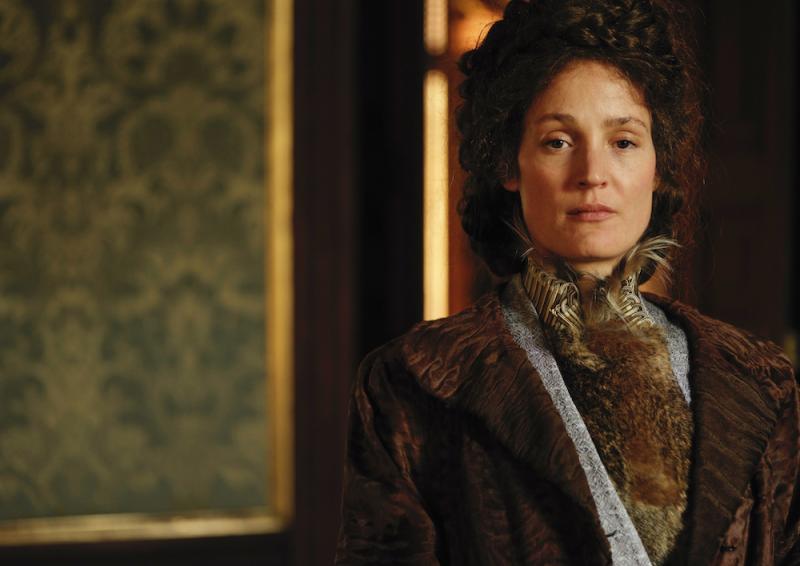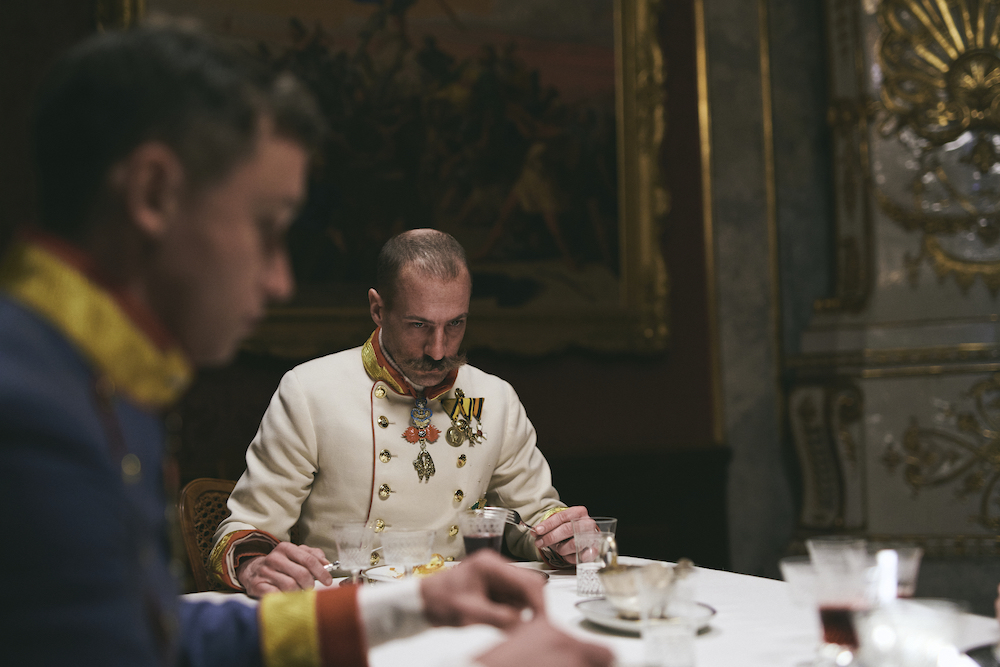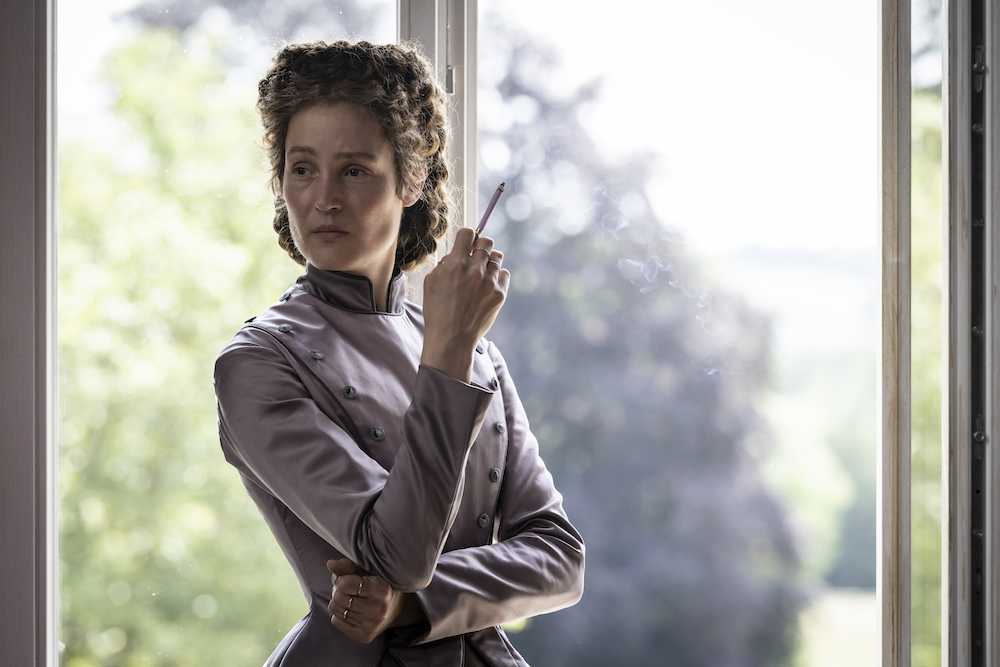Corsage review - Vicky Krieps is superb as Empress Elisabeth of Austria | reviews, news & interviews
Corsage review - Vicky Krieps is superb as Empress Elisabeth of Austria
Corsage review - Vicky Krieps is superb as Empress Elisabeth of Austria
No ordinary period drama: Marie Kreutzer's brilliantly inventive portrait of a royal rebel

“At the age of 40 a person begins to disperse and fade, darkening like a cloud,” says Elisabeth, Empress of Austria and Queen of Hungary, played by a mesmerising Vicky Krieps (Phantom Thread) in Austrian director Marie Kreutzer’s brilliant, fictionalised portrait of a woman whose main duties are to have her hair braided and stay thin, eating only orange slices for dinner. If her looks fade in this circumscribed royal world, what will be left of her?
The action takes place over several months in 1877-8, in Vienna, Bavaria and England, as Elisabeth's 40th birthday comes and goes. Again and again, we see her corset strings being tightened by maids, some of whom don’t have the necessary strength. “Tighter, I said,” hisses the empress.
Her husband, the Emperor Franz-Joseph (Florian Teichtmeister, pictured below) who removes his mutton-chops when relaxing but keeps on his brocade jacket while having rare and unenthusiastic sex, is humourless and disapproving, as are her children, Rudolf (Aaron Friesz) and prim young daughter, Valerie (Rosa Hajjaj). Bored at dinner, she brings up the delicate subject of turmoil in Sarajevo, which infuriates Franz-Joseph. A woman's voice cannot be heard.
 Sissi is too wild, too flirtatious, too narcissistic, too much for all of them. She is constantly on the move, fencing, riding, swimming, even dancing in front of a prototype movie-camera. And she's always on the edge, suicidal, stepping out of windows, nearly drowning, shooting up heroin. This is prescribed by her doctor as a novelty on the market, good for all manner of ills and “absolutely harmless”. She’s a dab hand at faking a swoon when royal engagements get tedious, or when someone makes a tactless remark about her weight or complexion.
Sissi is too wild, too flirtatious, too narcissistic, too much for all of them. She is constantly on the move, fencing, riding, swimming, even dancing in front of a prototype movie-camera. And she's always on the edge, suicidal, stepping out of windows, nearly drowning, shooting up heroin. This is prescribed by her doctor as a novelty on the market, good for all manner of ills and “absolutely harmless”. She’s a dab hand at faking a swoon when royal engagements get tedious, or when someone makes a tactless remark about her weight or complexion.
She believes that only her main lady-in-waiting, Marie (Katharina Lorenz) truly loves her (apart from her dogs, perhaps), which is unfortunate for Marie as the autocratic empress forbids her from accepting a marriage proposal. “My last opportunity,” seethes Marie. Stealing baleful glances at her boss, she writes in her diary: “She is walking a path so narrow only one person can walk it.” But Marie’s role on this narrow path becomes more substantial than she could have imagined.
Sissi (a very different portrayal from that by Romy Schneider in the wildly popular eponymous 1955 German film trilogy) needs, more than anything, to be admired. She cannot exist without the male gaze, even as she resents her own powerlessness. “I love to look at you looking at me,” she tells her British riding instructor, Bay (Colin Morgan). “Do you remember me? Last time I came you said I was beautiful,” she urges a catatonic man when visiting a mental hospital, where, dressed all in purple, she dispenses candied violets.
She lets go a bit when visiting her cousin Ludwig of Bavaria (she’s always desperate to get away from home) who likes to party, though he lusts after stable boys rather than women. They swim in the dark – “I forbid you to drown in my lake,” he tells her. “I prefer the sea anyway, “ she replies - and dance to “Help Me Make It Through The Night”, strummed on a ukelele.
 This is disconcerting but oddly effective, as is hearing “As Tears Go By” with harp accompaniment a little later (Kreuzer, whose sixth feature this is, has said she had no interest in making a classic period film with a classic score, but wanted to use instruments that existed at the time). Other anachronisms include a plastic bucket and mop, electric lights and a telephone, as well as a lack of royal furniture and interiors that aren't of the period. There's a whisper of early Peter Greenaway as well as Pablo Larrain's Spencer and Sofia Coppola's Marie Antoinette in the air.
This is disconcerting but oddly effective, as is hearing “As Tears Go By” with harp accompaniment a little later (Kreuzer, whose sixth feature this is, has said she had no interest in making a classic period film with a classic score, but wanted to use instruments that existed at the time). Other anachronisms include a plastic bucket and mop, electric lights and a telephone, as well as a lack of royal furniture and interiors that aren't of the period. There's a whisper of early Peter Greenaway as well as Pablo Larrain's Spencer and Sofia Coppola's Marie Antoinette in the air.
Ludwig pours chocolate into Sissi’s overflowing mouth and she starts to hatch a plan that will allow her to break out of her restrictive diet - and her life. Bring on the cakes and cream. The real empress was never seen in public after the age of 40 without a veil, and Kreutzer takes this fact and runs with it. What if Elisabeth disappeared altogether? She’s already taken control of her husband’s latest dalliance - “I want you to be his mistress,” she instructs the young girl. “Expect him in your bed without your corsage” – and now she hacks off her mass of hair. “It’s as though a part of you had died,” says the emperor. Prophetic words. This exhilarating, beautiful, inventive film, with its great depth of colour and luminous cinematography by Judith Kaufmann, shows us a woman determined to live, or die, on her own terms.
Add comment
The future of Arts Journalism
You can stop theartsdesk.com closing!
We urgently need financing to survive. Our fundraising drive has thus far raised £49,000 but we need to reach £100,000 or we will be forced to close. Please contribute here: https://gofund.me/c3f6033d
And if you can forward this information to anyone who might assist, we’d be grateful.

Subscribe to theartsdesk.com
Thank you for continuing to read our work on theartsdesk.com. For unlimited access to every article in its entirety, including our archive of more than 15,000 pieces, we're asking for £5 per month or £40 per year. We feel it's a very good deal, and hope you do too.
To take a subscription now simply click here.
And if you're looking for that extra gift for a friend or family member, why not treat them to a theartsdesk.com gift subscription?
more Film
 The Courageous review - Ophélia Kolb excels as a single mother on the edge
Jasmin Gordon's directorial debut features strong performances but leaves too much unexplained
The Courageous review - Ophélia Kolb excels as a single mother on the edge
Jasmin Gordon's directorial debut features strong performances but leaves too much unexplained
 Blu-ray: The Graduate
Post #MeToo, can Mike Nichols' second feature still lay claim to Classic Film status?
Blu-ray: The Graduate
Post #MeToo, can Mike Nichols' second feature still lay claim to Classic Film status?
 Little Trouble Girls review - masterful debut breathes new life into a girl's sexual awakening
Urska Dukic's study of a confused Catholic teenager is exquisitely realised
Little Trouble Girls review - masterful debut breathes new life into a girl's sexual awakening
Urska Dukic's study of a confused Catholic teenager is exquisitely realised
 Young Mothers review - the Dardennes explore teenage motherhood in compelling drama
Life after birth: five young mothers in Liège struggle to provide for their babies
Young Mothers review - the Dardennes explore teenage motherhood in compelling drama
Life after birth: five young mothers in Liège struggle to provide for their babies
 Blu-ray: Finis Terrae
Bleak but compelling semi-documentary, filmed on location in Brittany
Blu-ray: Finis Terrae
Bleak but compelling semi-documentary, filmed on location in Brittany
 Oslo Stories Trilogy: Sex review - sexual identity slips, hurts and heals
A quietly visionary series concludes with two chimney sweeps' awkward sexual liberation
Oslo Stories Trilogy: Sex review - sexual identity slips, hurts and heals
A quietly visionary series concludes with two chimney sweeps' awkward sexual liberation
 Sorry, Baby review - the healing power of friendship in the aftermath of sexual assault
Eva Victor writes, directs and stars in their endearing debut feature
Sorry, Baby review - the healing power of friendship in the aftermath of sexual assault
Eva Victor writes, directs and stars in their endearing debut feature
 Blu-ray: Who Wants to Kill Jessie?
Fast-paced and visually inventive Czech comedy
Blu-ray: Who Wants to Kill Jessie?
Fast-paced and visually inventive Czech comedy
 Oslo Stories Trilogy: Love review - freed love
Gay cruising offers straight female lessons in a heady ode to urban connection
Oslo Stories Trilogy: Love review - freed love
Gay cruising offers straight female lessons in a heady ode to urban connection
 Beating Hearts review - kiss kiss, slam slam
Romance and clobberings in a so-so French melodrama
Beating Hearts review - kiss kiss, slam slam
Romance and clobberings in a so-so French melodrama
 Materialists review - a misfiring romcom or an undercooked satire?
Writer-director Celine Song's latest can't decide what kind of film it is
Materialists review - a misfiring romcom or an undercooked satire?
Writer-director Celine Song's latest can't decide what kind of film it is

Comments
All I thought after seeing